In an increasingly digital world, finding the right tools to foster a love of reading can feel overwhelming for parents, caregivers, and educators. While the screen time debate is valid, not all screen time is created equal. The best reading apps for kids transform devices from simple distractions into powerful tools for literacy, offering everything from interactive phonics lessons to vast digital libraries tailored to your child's interests.
However, navigating the crowded app market is a challenge. How do you choose the platform that best fits your child's specific age, learning style, and your family's budget? This comprehensive guide cuts through the noise. We have analyzed 12 of the top reading apps, providing a detailed breakdown of their specific strengths, potential drawbacks, and ideal use cases for different learners. This list will help you select the right tool, whether you're supporting a preschooler just starting with letter sounds or an independent reader hungry for new chapter books.
Our goal is to look beyond marketing claims and provide practical insights to help you turn screen time into valuable reading time. While digital apps are fantastic, they often work best alongside tangible learning methods. For early learners, this can include activities like making alphabet flash cards fun and effective to reinforce letter recognition. This guide will provide the details you need, including screenshots and direct links for each app, to make an informed decision and support your young reader's journey.
1. Epic
Often called the "Netflix for kids' books," Epic stands out as one of the best reading apps for kids due to its sheer volume and quality curation. It provides an all-in-one digital library with over 40,000 high-quality books, audiobooks, and educational videos, making it an incredibly comprehensive resource for children ages 2-12.
What sets Epic apart is its seamless integration between home and school use. Families can get unlimited access with a subscription, but many educators use the free school version. This allows kids to access a vast, assigned library during school hours (7 a.m.–3 p.m. weekdays) using a class code, which is a fantastic no-cost option. The platform’s "Read-to-Me" feature, with human-voiced narration and word highlighting, is particularly effective for emerging readers, helping them build confidence and fluency.
Quick Look
- Best For: All-in-one reading access for pre-K through elementary school.
- Pricing: Free for educators and students during school hours. Family plans are around $11.99/month or $79.99/year.
- Link: www.getepic.com
Pros:
- Vast, well-curated library of popular and educational titles.
- Excellent school integration with free daytime access.
- Supports offline reading for downloaded books (on the app).
Cons:
- Full, unlimited access requires a paid family subscription.
- Audiobooks cannot be downloaded for offline listening.
- The web browser version can feel more limited than the mobile app.
2. ABCmouse
ABCmouse is a comprehensive early learning academy that goes beyond just reading. Designed for children ages 2-8, it presents a structured, game-like adventure through core subjects including reading, math, science, and art. Its reading component is built on a strong phonics foundation, guiding young learners through a step-by-step curriculum that makes it one of the best reading apps for kids just starting their literacy journey.
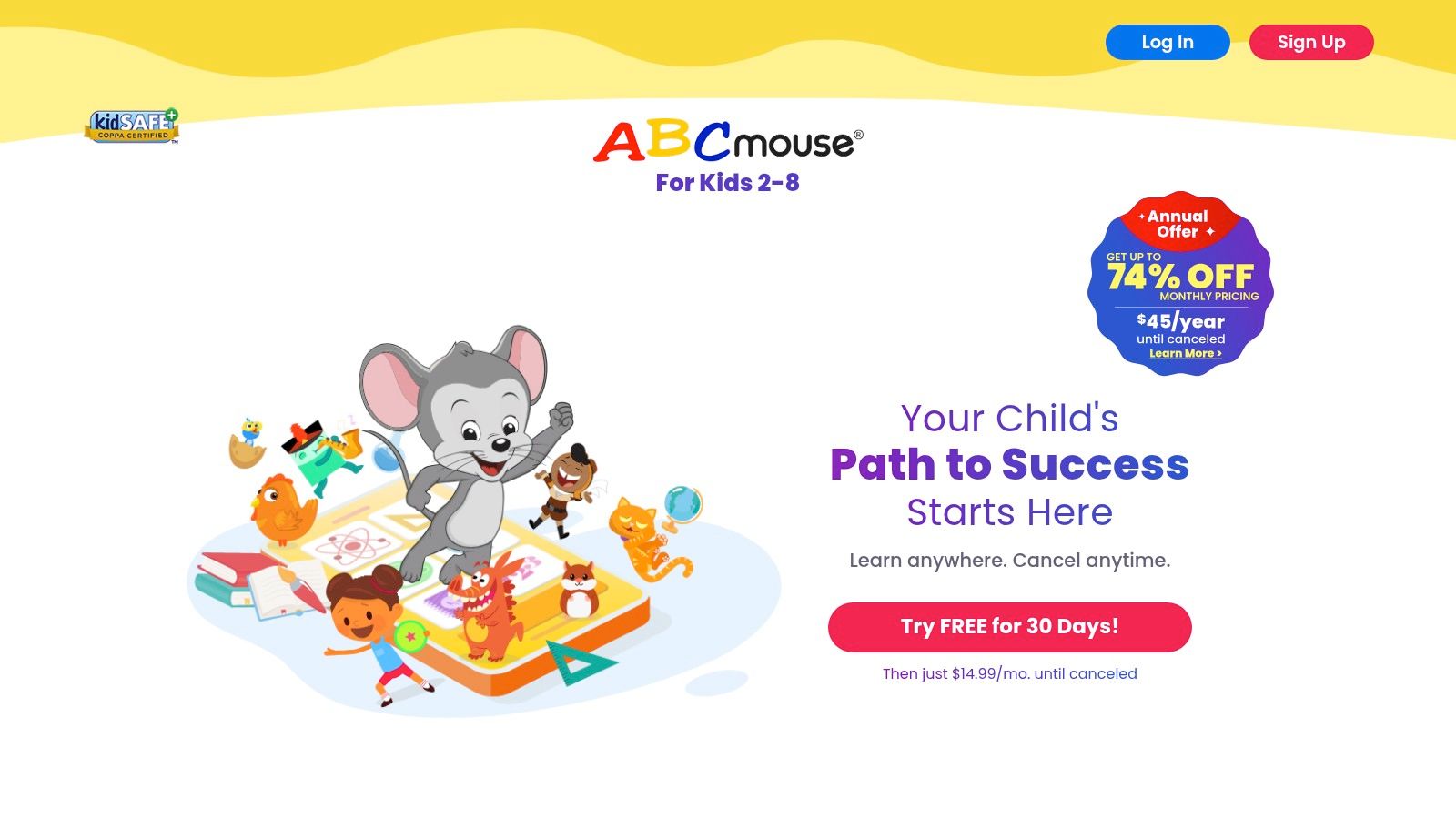
What makes ABCmouse unique is its "Step-by-Step Learning Path," which presents over 10,000 activities, including interactive books, games, and songs, in a specific, research-validated order. This structure removes the guesswork for parents, ensuring children build skills progressively. The platform also includes a robust parent dashboard that tracks progress, allowing caregivers to see exactly what their child is learning and where they might need extra help. Up to three children can have their own customizable profiles and learning paths under one account.
Quick Look
- Best For: Structured, foundational learning for toddlers, preschoolers, and early elementary students (ages 2-8).
- Pricing: Typically around $12.99/month, with discounts for annual subscriptions. Often offers a 30-day free trial.
- Link: www.abcmouse.com
Pros:
- Highly structured, step-by-step curriculum is great for foundational skills.
- Massive library of over 10,000 varied activities keeps kids engaged.
- Detailed progress tracking for parents provides valuable insights.
Cons:
- Reading is part of a larger curriculum, not a dedicated reading-only app.
- The subscription auto-renews and can be difficult to cancel or get refunds for.
- May be too basic for children who are already confident readers.
3. HOMER Learn & Grow
HOMER Learn & Grow is a research-backed early learning program designed to build a strong foundation for reading. Unlike apps that are simply digital libraries, HOMER creates a personalized, step-by-step phonics pathway for children ages 2-8. It assesses a child’s current level and builds a custom curriculum with short, engaging daily lessons that cover reading, math, and social-emotional skills.
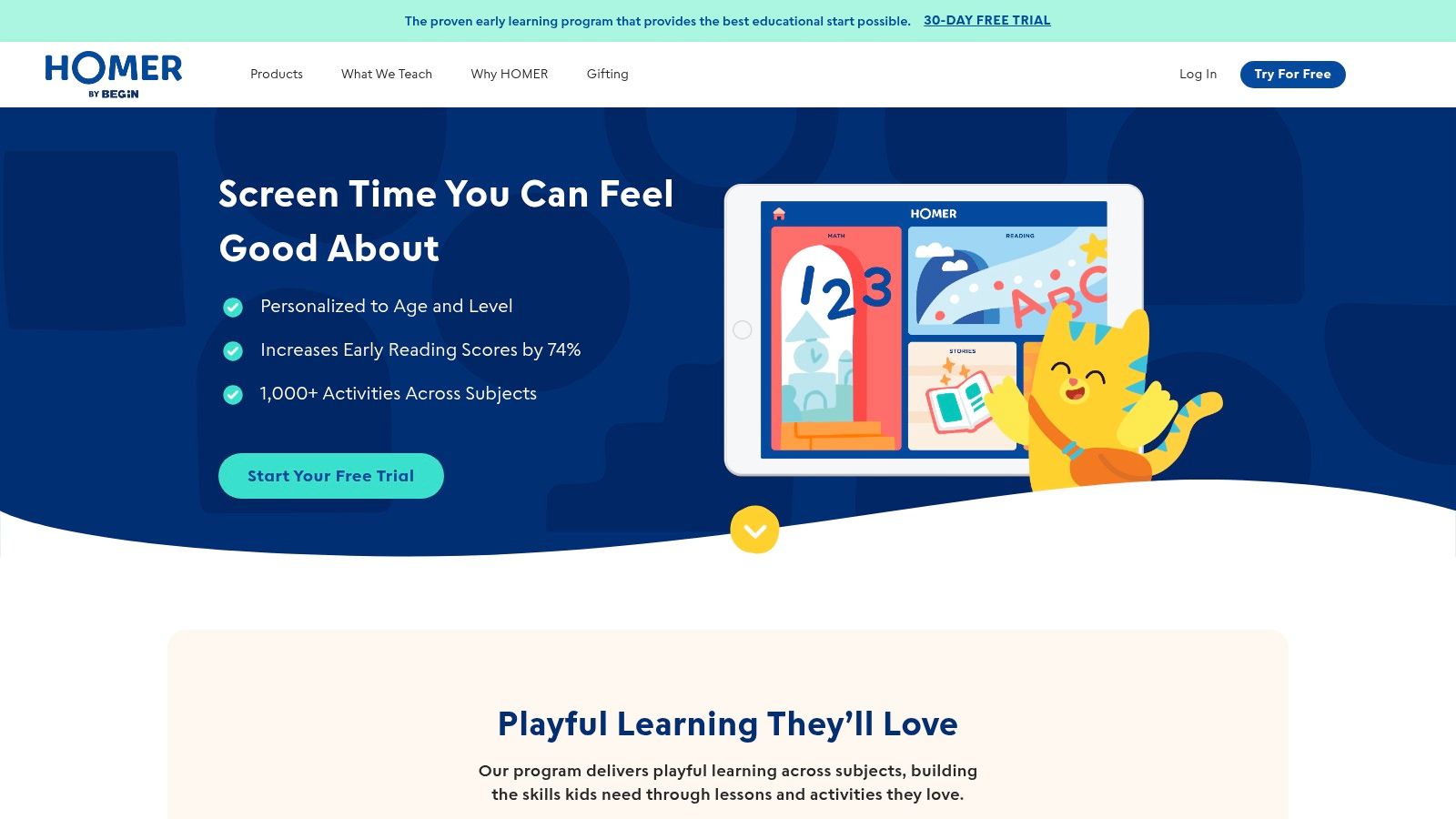
What makes HOMER one of the best reading apps for kids in the early years is its singular focus on foundational skill-building. The app combines phonics instruction with stories, games, and creative activities, making the learning process feel like play. It supports up to four child profiles under one account, making it a great value for families, and includes offline activities and printables to extend learning beyond the screen.
Quick Look
- Best For: Toddlers and preschoolers (ages 2-8) needing a structured, phonics-based start to reading.
- Pricing: Offers a free trial. Family plans are around $12.99/month or a more cost-effective $59.99/year.
- Link: www.learnwithhomer.com
Pros:
- Strong, personalized phonics curriculum grounded in research.
- Short, effective daily lessons are perfect for young attention spans.
- Family-friendly pricing, especially with the annual plan for up to four children.
Cons:
- Most interactive features require an internet connection.
- Progress reporting for parents can be less detailed than some other apps.
- Content is heavily focused on the 2-8 age range, with less for older kids.
4. Reading Eggs
Reading Eggs is a comprehensive, research-backed program designed to guide children through the entire learn-to-read journey. Unlike apps that are primarily digital libraries, this platform focuses on structured, gamified lessons that build skills sequentially, making it one of the best reading apps for kids who need a clear path from phonics and sight words to fluency and comprehension. The self-paced lessons feel like a game, keeping young learners engaged as they complete activities, earn rewards, and progress through a map of learning adventures.
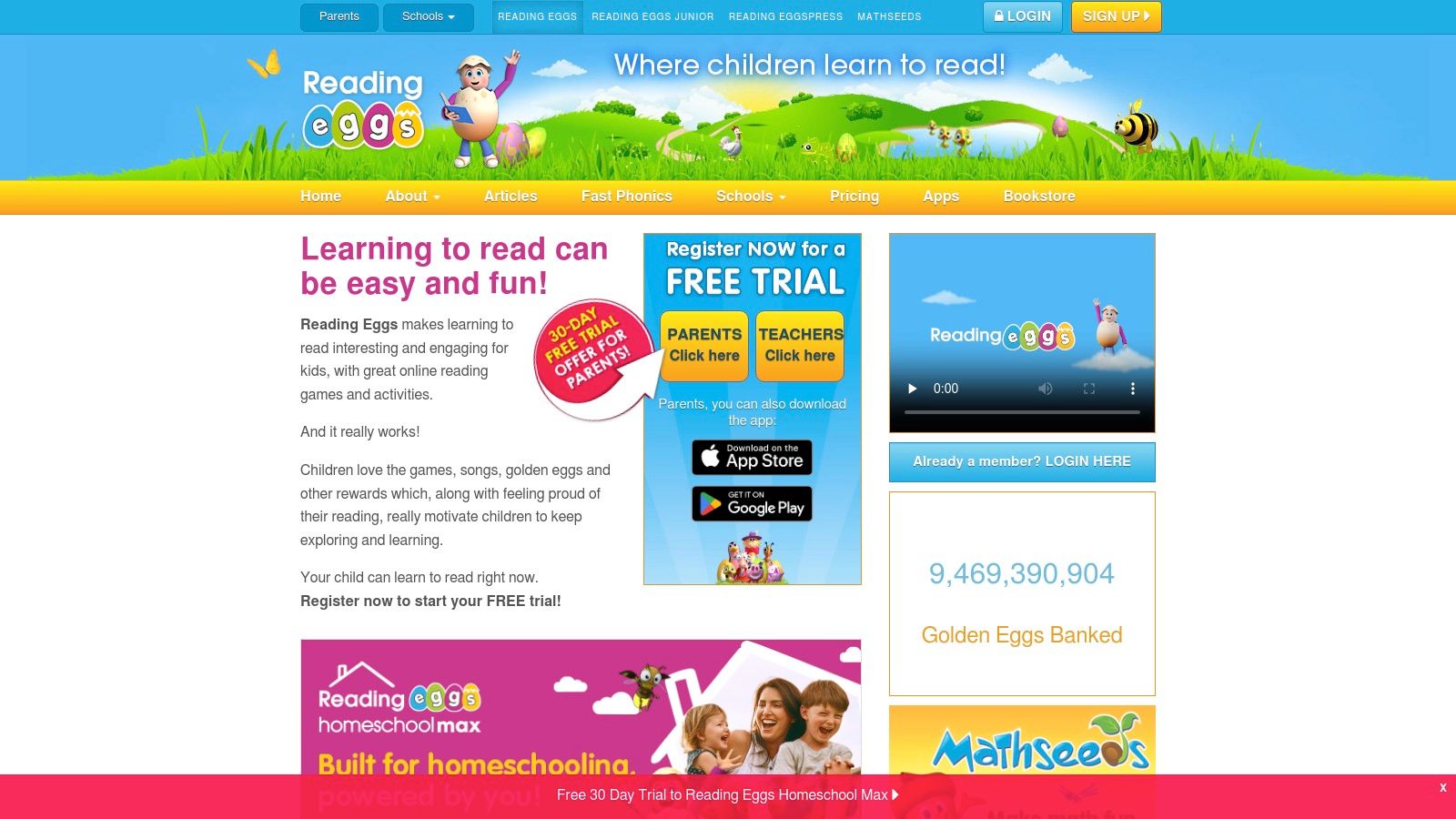
What makes Reading Eggs stand out is its diagnostic placement test, which ensures each child starts at the appropriate level. The program then adapts, offering over 3,000 e-books that match the child’s current reading ability. It also includes Reading Eggspress for older kids (ages 7-13) to focus on comprehension and grammar. The optional Mathseeds bundle creates a powerful, all-in-one learning tool for families looking for both literacy and numeracy support in a single subscription.
Quick Look
- Best For: Structured, game-based learning for foundational reading skills (ages 2-13).
- Pricing: Starts around $9.99/month. Annual family plans offer better value, often around $69.99/year. Free trial available.
- Link: www.readingeggs.com
Pros:
- Highly structured, step-by-step curriculum builds skills logically.
- Strong focus on phonics is excellent for early readers.
- Engaging, game-like interface motivates children to continue learning.
Cons:
- The "gamey" design may be overstimulating or feel dated to some.
- Annual subscriptions auto-renew and must be manually canceled.
- Less focused on free-choice reading and more on skill-building lessons.
5. Hooked on Phonics
A trusted name for decades, Hooked on Phonics has successfully transitioned its proven learn-to-read method into one of the best reading apps for kids focused on foundational skills. The program uses a systematic, step-by-step approach to phonics through engaging lessons, songs, and games that guide children from letter sounds to reading full sentences. It’s designed to be a comprehensive curriculum that builds skills sequentially.
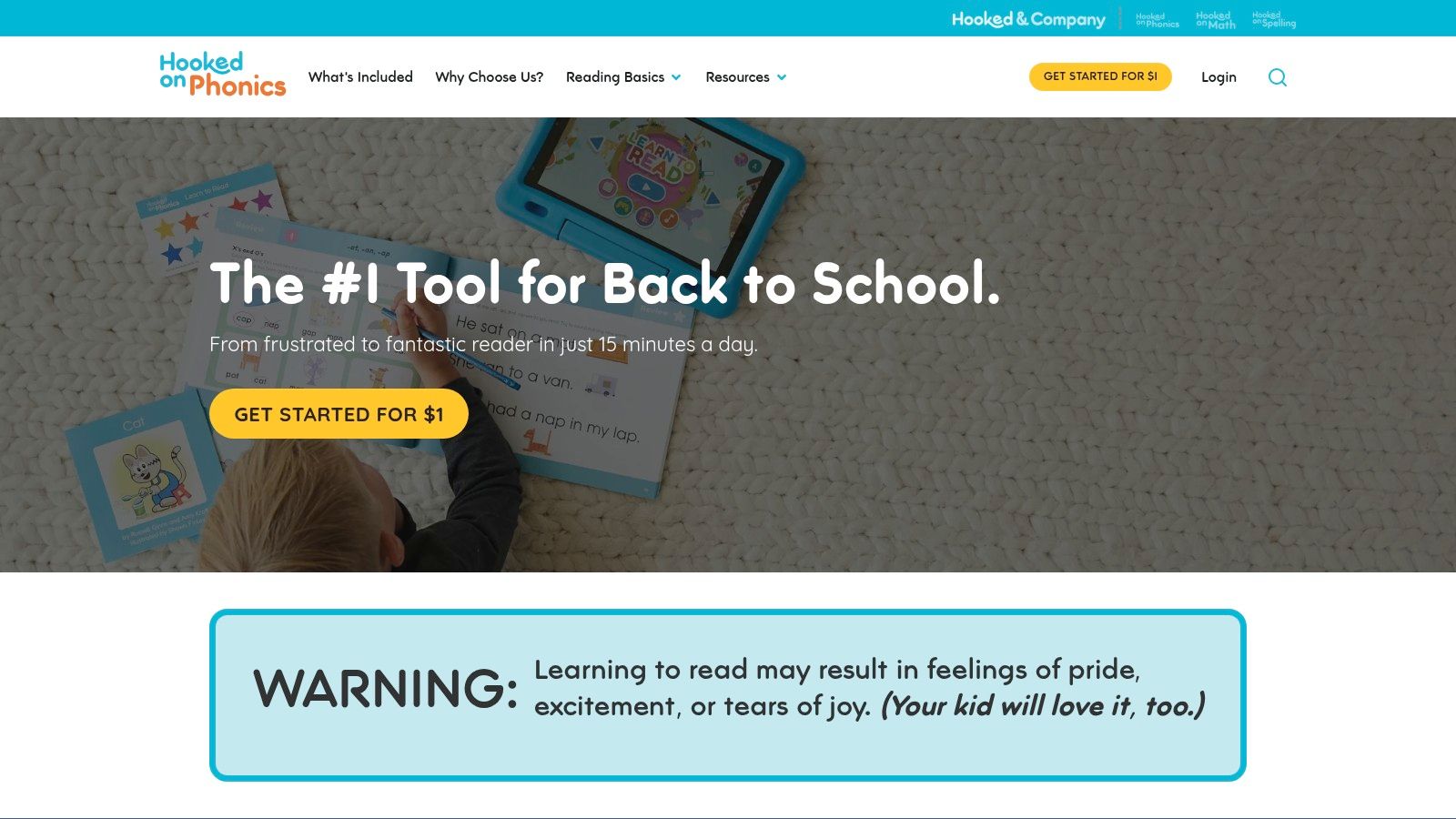
What makes Hooked on Phonics unique is its blended learning model. Alongside the digital app, subscribers can opt to receive physical Practice Packs in the mail, which include workbooks and storybooks that correspond to the in-app lessons. This combination of screen time with hands-on materials reinforces concepts and caters to different learning styles, helping to solidify reading skills for young learners in a powerful, multi-sensory way.
Quick Look
- Best For: Young children (ages 3-7) who are just beginning their reading journey.
- Pricing: App-only plans start around $12.99/month. The app plus Practice Packs plan is typically around $19.95/month, though pricing can vary.
- Link: https://hookedonphonics.com
Pros:
- Trusted, step-by-step phonics curriculum that has been effective for decades.
- Combines a digital app with hands-on physical workbooks and readers.
- Supports multiple user profiles for families with more than one child.
Cons:
- Pricing can be confusing, with different offers on the website versus in-app purchases.
- The focus is strictly on phonics, so it's less of a general library app.
- The subscription model can be a significant ongoing cost for families.
6. Khan Academy Kids
Khan Academy Kids is a powerhouse of early childhood education, and while it's a comprehensive learning app, its reading and literacy components are strong enough to earn it a spot among the best reading apps for kids. It offers a free, engaging, and ad-free experience for children ages 2-8, covering everything from letter recognition and phonics to early reading comprehension through a library of original books and activities.
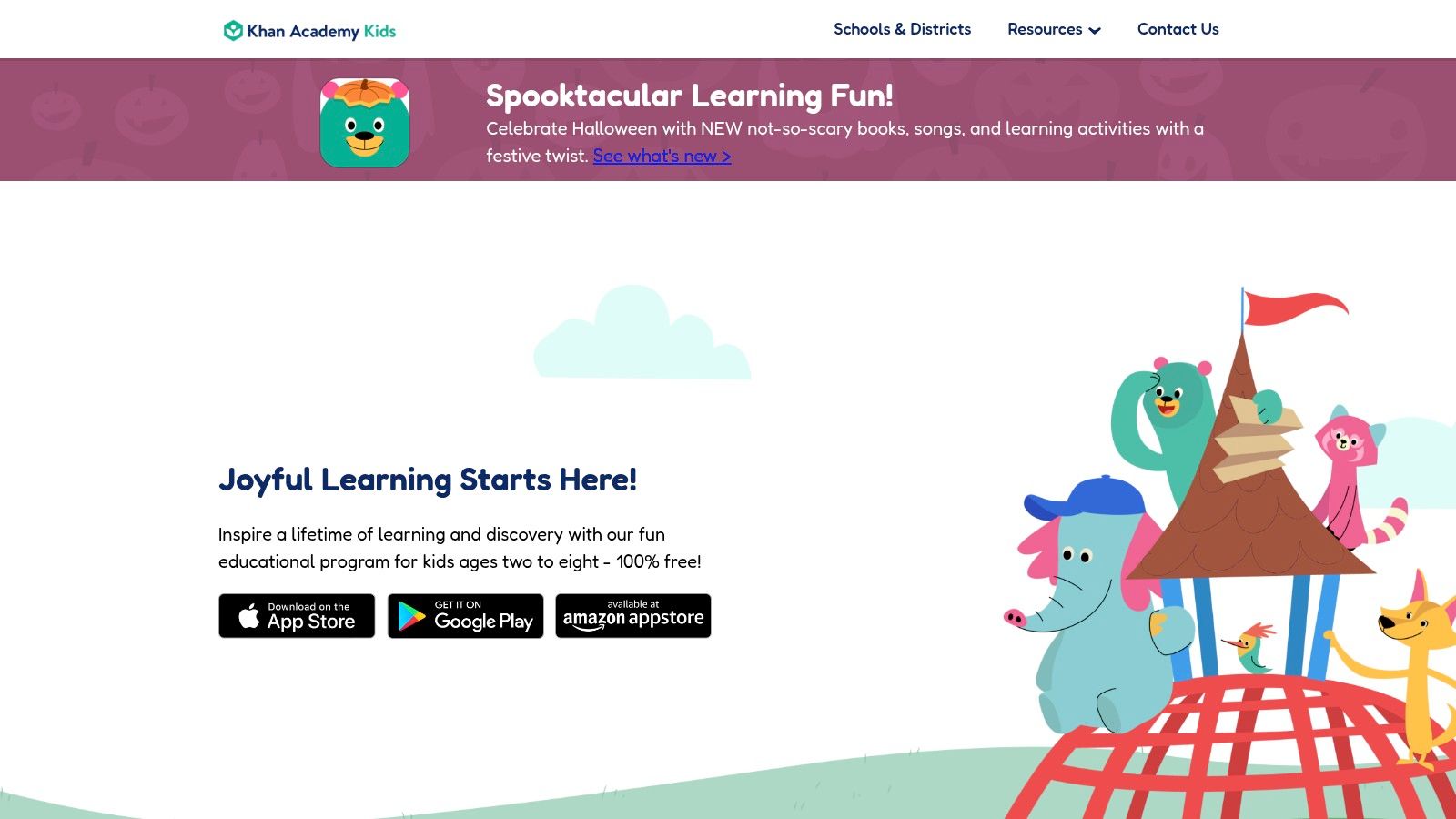
What makes this app exceptional is its commitment to providing a high-quality, expert-designed curriculum at absolutely no cost. The platform uses an adaptive learning path that adjusts to each child's skill level, ensuring they are appropriately challenged without feeling overwhelmed. Its engaging characters and mix of stories, videos, and interactive games make it a well-rounded tool for building foundational reading skills alongside math, logic, and social-emotional development. It’s an ideal, budget-friendly starting point for any young learner.
Quick Look
- Best For: Free, foundational literacy and early reading skills for ages 2-8.
- Pricing: Completely free with no ads, subscriptions, or in-app purchases.
- Link: www.khanacademy.org/kids
Pros:
- High-quality, comprehensive early learning at no cost.
- Expert-designed curriculum that adapts to a child’s progress.
- Useful supplement to develop reading skills affordably.
Cons:
- Broader curriculum rather than a reading-only app.
- Smaller content library compared to paid book-subscription services.
- Primarily focused on foundational skills for younger children (up to age 8).
7. Raz-Kids (Learning A-Z)
A staple in many classrooms, Raz-Kids is a powerful leveled reading platform designed to provide structured practice. It offers hundreds of digital books organized by reading level, allowing children to progress systematically. The platform is less of an open library and more of a targeted tool for improving specific reading skills, making it one of the best reading apps for kids who need focused support.
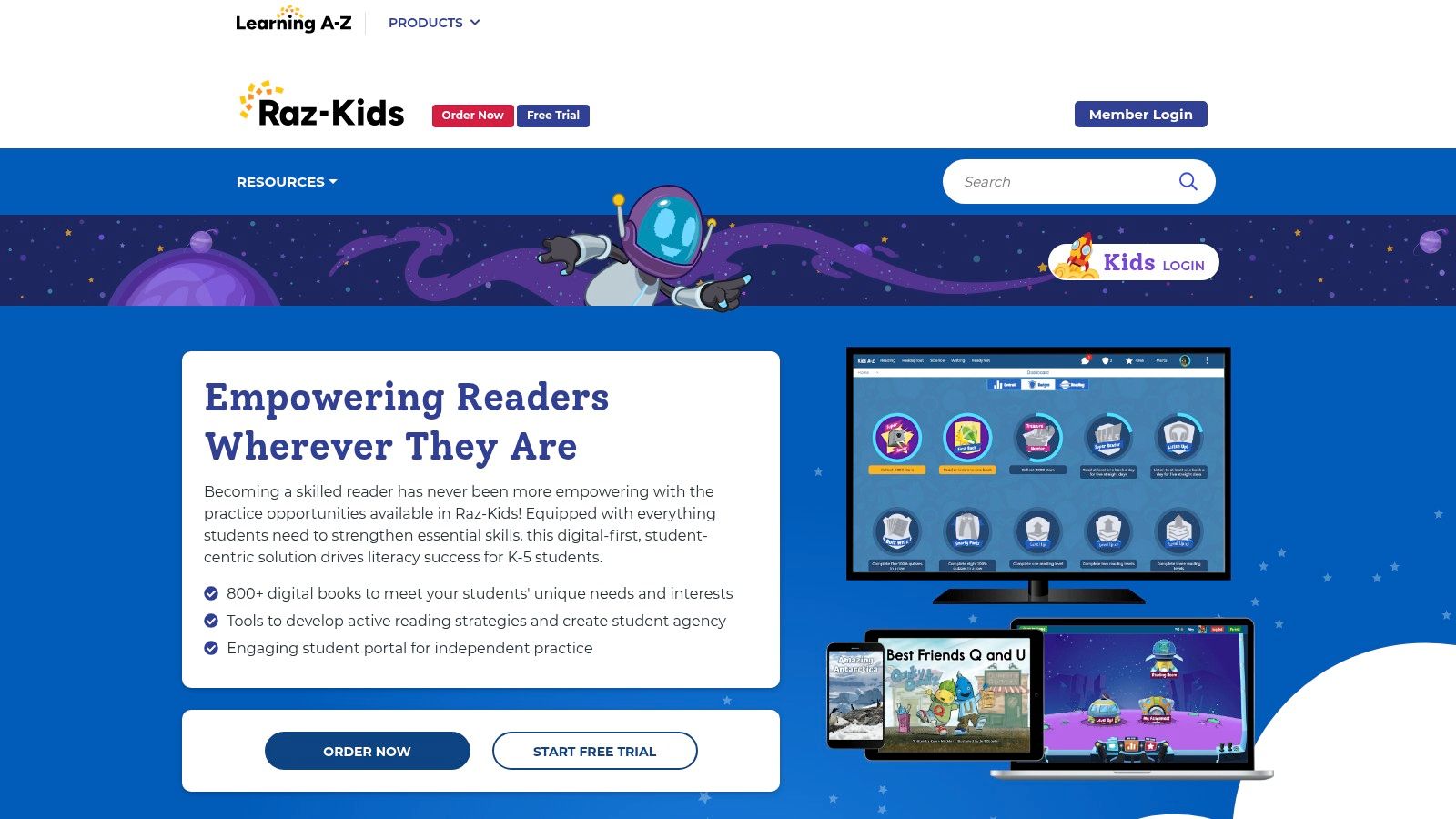
What makes Raz-Kids effective is its three-step process for each book: Listen, Read, and Quiz. The listen-along feature builds familiarity, the independent reading portion (with a recording tool for fluency checks) builds confidence, and the comprehension quiz ensures understanding. This structured approach provides valuable data for parents and teachers, helping them track progress and identify areas for improvement. You can learn more about developing reading comprehension skills with these targeted strategies.
Quick Look
- Best For: Structured, leveled reading practice and comprehension assessment.
- Pricing: Primarily sold as school and district licenses. Individual family subscriptions are around $125.95/year.
- Link: www.raz-kids.com
Pros:
- Strong, research-based approach with leveled texts.
- Excellent progress monitoring tools for parents and teachers.
- Comprehension quizzes reinforce understanding after each book.
Cons:
- Its teacher-centric design can feel less intuitive for families purchasing directly.
- The library is smaller and less entertainment-focused than platforms like Epic.
- The interface can feel dated compared to more modern apps.
8. Vooks
Vooks uniquely positions itself as a "streaming library of animated storybooks," transforming classic and new children's books into engaging video experiences. Instead of static pages, each story is brought to life with gentle animation, narration, and highlighted read-along text, making it an excellent bridge between screen time and reading time. This approach is particularly effective for visual learners and can captivate reluctant readers who may be intimidated by traditional text.
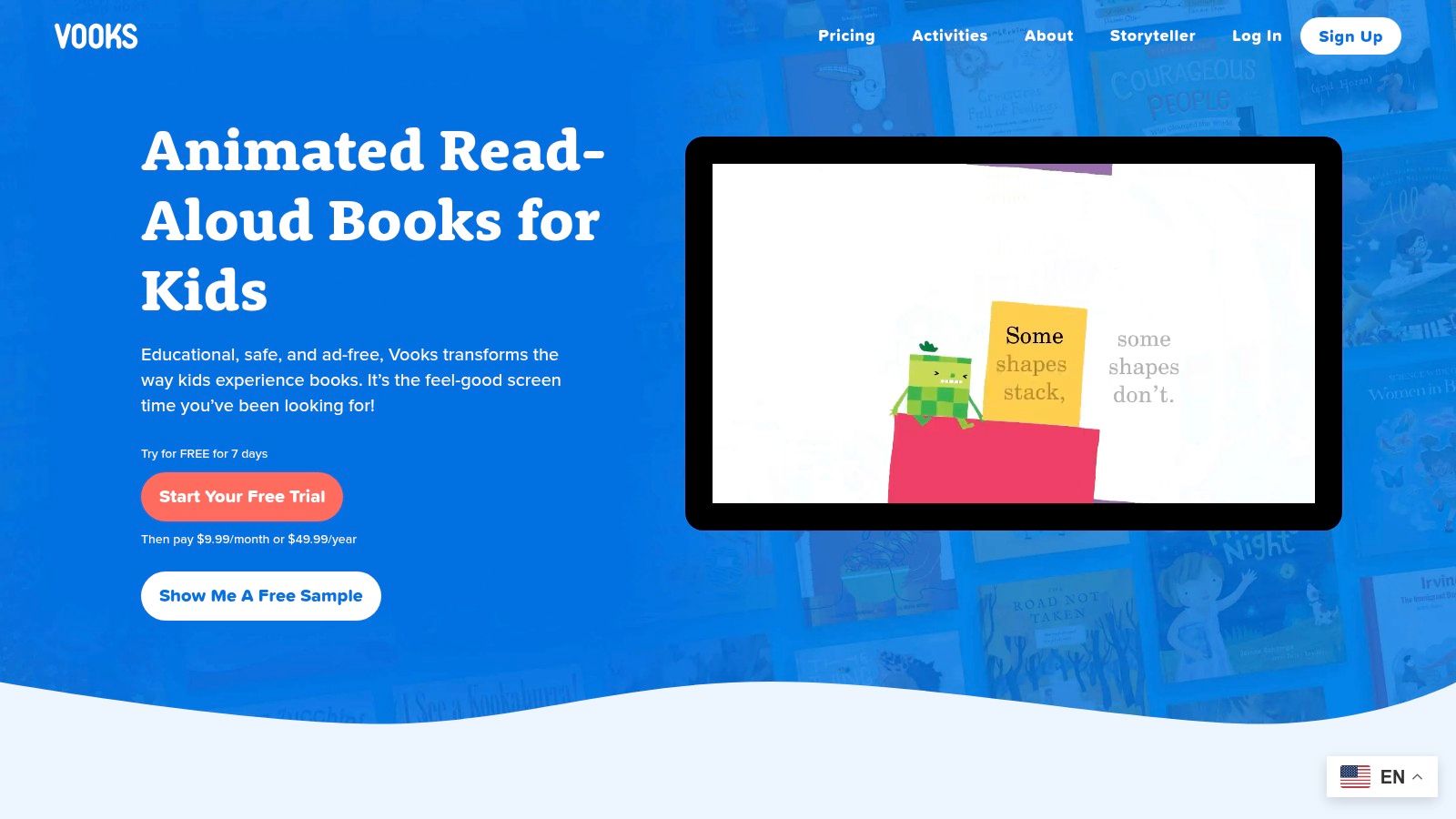
The platform’s strength lies in its ability to support pre-readers and emerging readers by building vocabulary and story comprehension in a low-pressure, entertaining format. With a kid-safe, ad-free interface and offline viewing capabilities on its apps, Vooks is a fantastic tool for family read-aloud sessions or quiet independent time. While not a replacement for phonics instruction, it stands out among the best reading apps for kids by fostering a genuine love for storytelling.
Quick Look
- Best For: Engaging pre-readers and early elementary students with animated stories.
- Pricing: Free 7-day trial, then plans start at $4.99/month or $49.99/year. A free version for educators is also available.
- Link: www.vooks.com
Pros:
- High-quality animation and narration make stories engaging for young kids.
- Excellent for building vocabulary and comprehension in a fun format.
- Safe, ad-free environment with offline viewing options.
Cons:
- Functions as a story-video library, not an interactive learn-to-read app.
- The library is smaller and more curated compared to vast ebook platforms.
- Best suited for a younger audience (typically ages 2-8).
9. Starfall
A true classic in the digital learning space, Starfall has been a go-to resource for early literacy for decades. This nonprofit platform excels with its phonics-first approach, using engaging songs, games, and decodable stories to help children master the building blocks of reading. It’s a foundational tool designed to take kids from letter recognition all the way to independent reading, making it one of the best reading apps for kids just starting their journey.
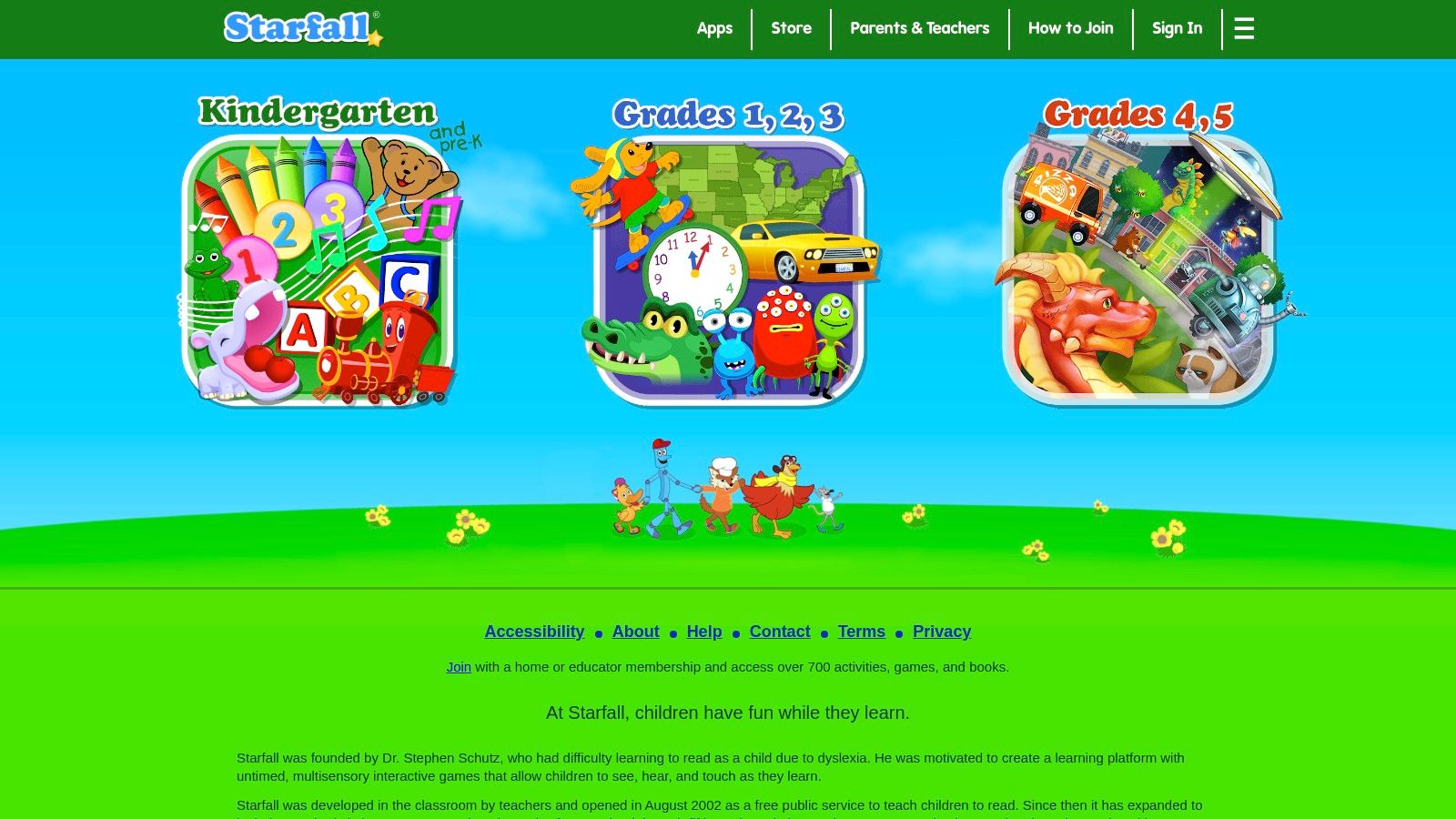
While many apps focus on vast digital libraries, Starfall prioritizes skill-building. The content is structured sequentially, allowing children to progress naturally through phonics rules and sight words in a low-pressure environment. Although its interface may feel a bit dated compared to newer apps, its educational effectiveness and longstanding, trusted reputation in both homes and classrooms make it an invaluable resource for Pre-K through 3rd grade.
Quick Look
- Best For: Foundational phonics and learn-to-read activities for Pre-K to 3rd grade.
- Pricing: A significant amount of content is free. A full membership is about $35/year for home use.
- Link: www.starfall.com
Pros:
- Excellent, structured phonics-based curriculum.
- Budget-friendly membership unlocks all content.
- Longstanding, trusted reputation in early literacy.
Cons:
- The interface looks and feels traditional.
- Not a vast commercial-style library of popular books.
- A membership is required to access the full range of activities.
10. Teach Your Monster to Read
For parents of emerging readers, Teach Your Monster to Read is a uniquely engaging and effective tool that makes learning phonics feel like play. Developed by the Usborne Foundation, this award-winning series of games takes children on a magical journey where they create a monster and teach it to read. The platform’s strength lies in its research-backed, game-based approach that covers everything from letter sounds to reading full sentences across its three extensive games.
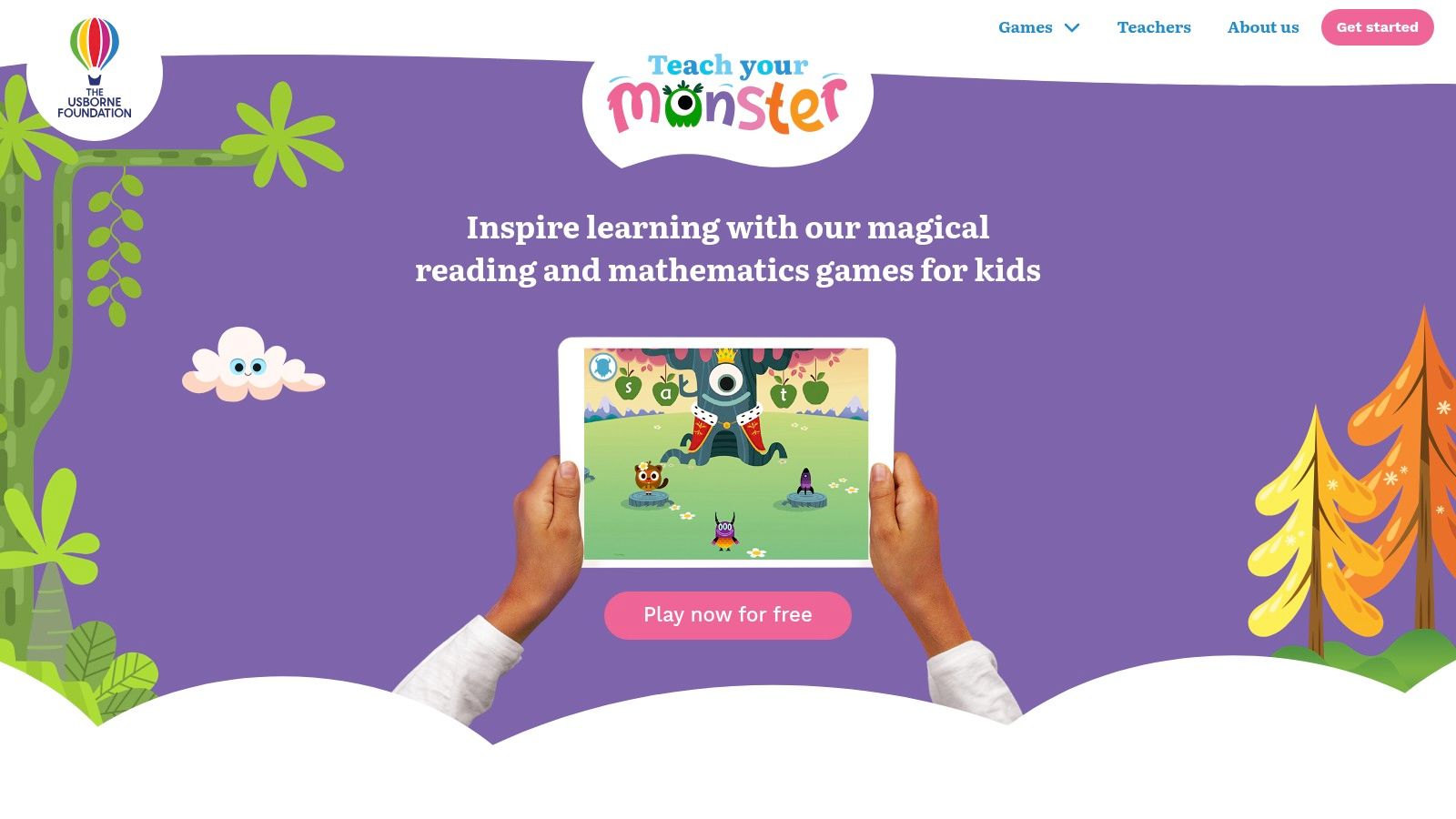
Unlike library-style reading apps for kids, this platform is a structured phonics program designed to build foundational skills from the ground up. What makes it stand out is its commitment to access: the entire program is completely free to play on a computer via their website. While the mobile apps require a one-time purchase, this model is a refreshing change from recurring subscriptions. The progression is systematic and adaptive, ensuring children master core concepts before moving on.
Quick Look
- Best For: Early learners (ages 3-6) mastering phonics and foundational reading skills.
- Pricing: Free to play all games on the website. Mobile apps are a one-time purchase (price varies).
- Link: www.teachyourmonster.org
Pros:
- Highly engaging game-based format keeps young children motivated.
- Completely free to access on any desktop or laptop browser.
- Research-backed curriculum that systematically builds phonics skills.
Cons:
- Strictly focused on phonics, not a general-purpose reading or ebook library.
- Mobile app access requires a separate purchase for each game.
- Can be less challenging for children who have already mastered basic phonics.
11. Reading.com (Learn to Read)
Reading.com stands out among the best reading apps for kids by focusing specifically on the foundational "learn to read" process through a structured, parent-led phonics program. It offers 99 step-by-step lessons designed for parents and children to complete together, blending direct instruction with decodable books, instructional videos, and interactive games for ages 3 to 8.
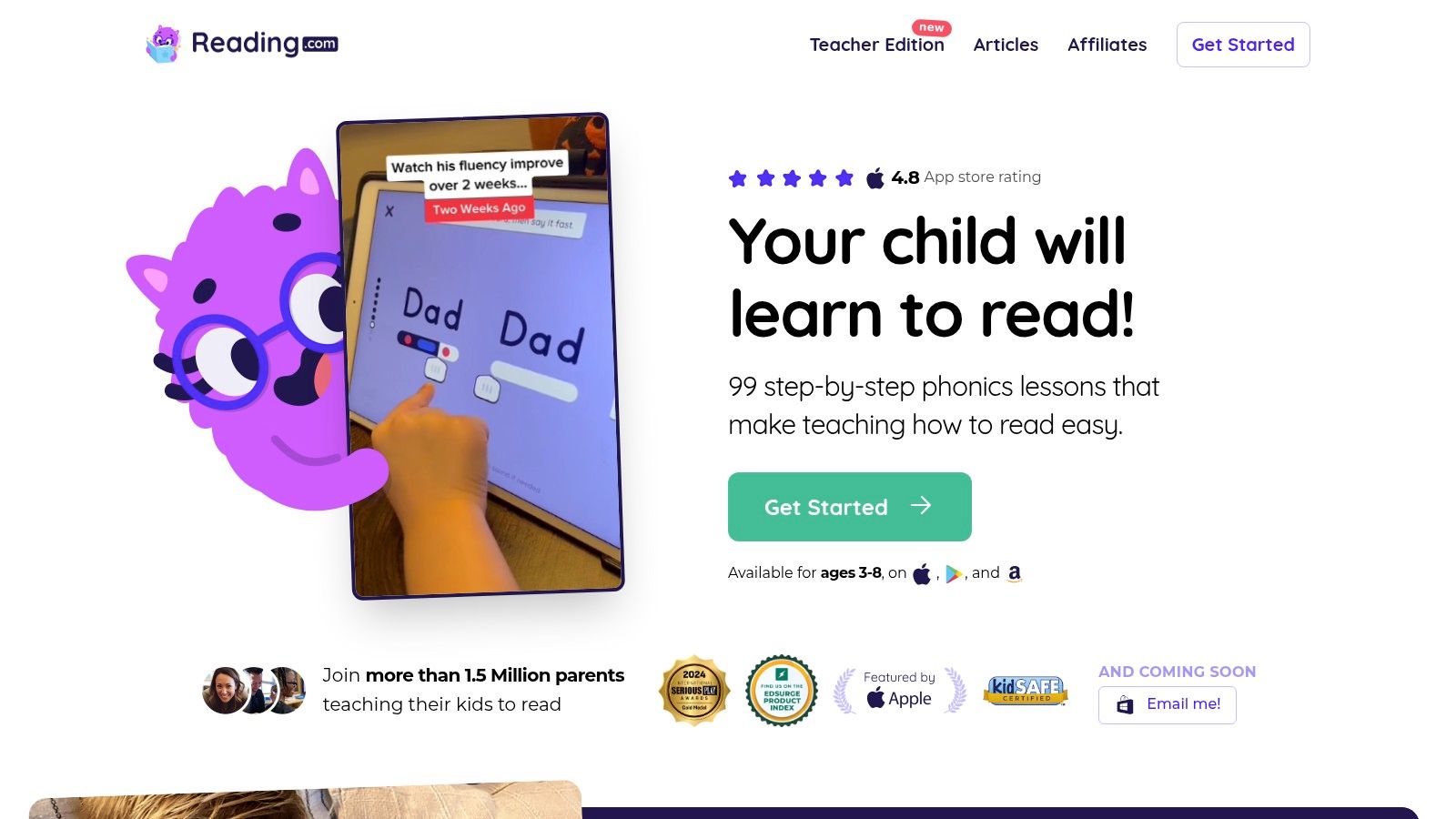
Unlike apps that function as vast digital libraries, Reading.com is a scripted curriculum that guides families through a clear scope and sequence. Each lesson builds logically on the last, ensuring children master phonics skills systematically. The app's design encourages co-play, making it a powerful tool for parents who want to be actively involved in their child's reading journey in a supportive, ad-free environment.
Quick Look
- Best For: Parents seeking a guided, step-by-step phonics curriculum for early readers.
- Pricing: Requires a subscription, with pricing that can vary based on app store and current promotions.
- Link: www.reading.com
Pros:
- Provides strong parent guidance with clearly scripted lessons.
- Focused, systematic phonics instruction is easy to follow.
- Supports up to three child profiles on one account.
Cons:
- Does not function as a large library of popular trade books.
- Subscription model is required for access.
- Designed primarily for parent-child interaction, not independent play.
12. Libby by OverDrive
For families looking to leverage their existing local library resources, Libby is arguably one of the best reading apps for kids available today. It’s a beautifully designed, user-friendly app that connects directly to your public library’s digital collection. Users can borrow ebooks, audiobooks, magazines, and even comics for free with a valid library card, making an enormous catalog of high-quality content accessible without any subscription fees.
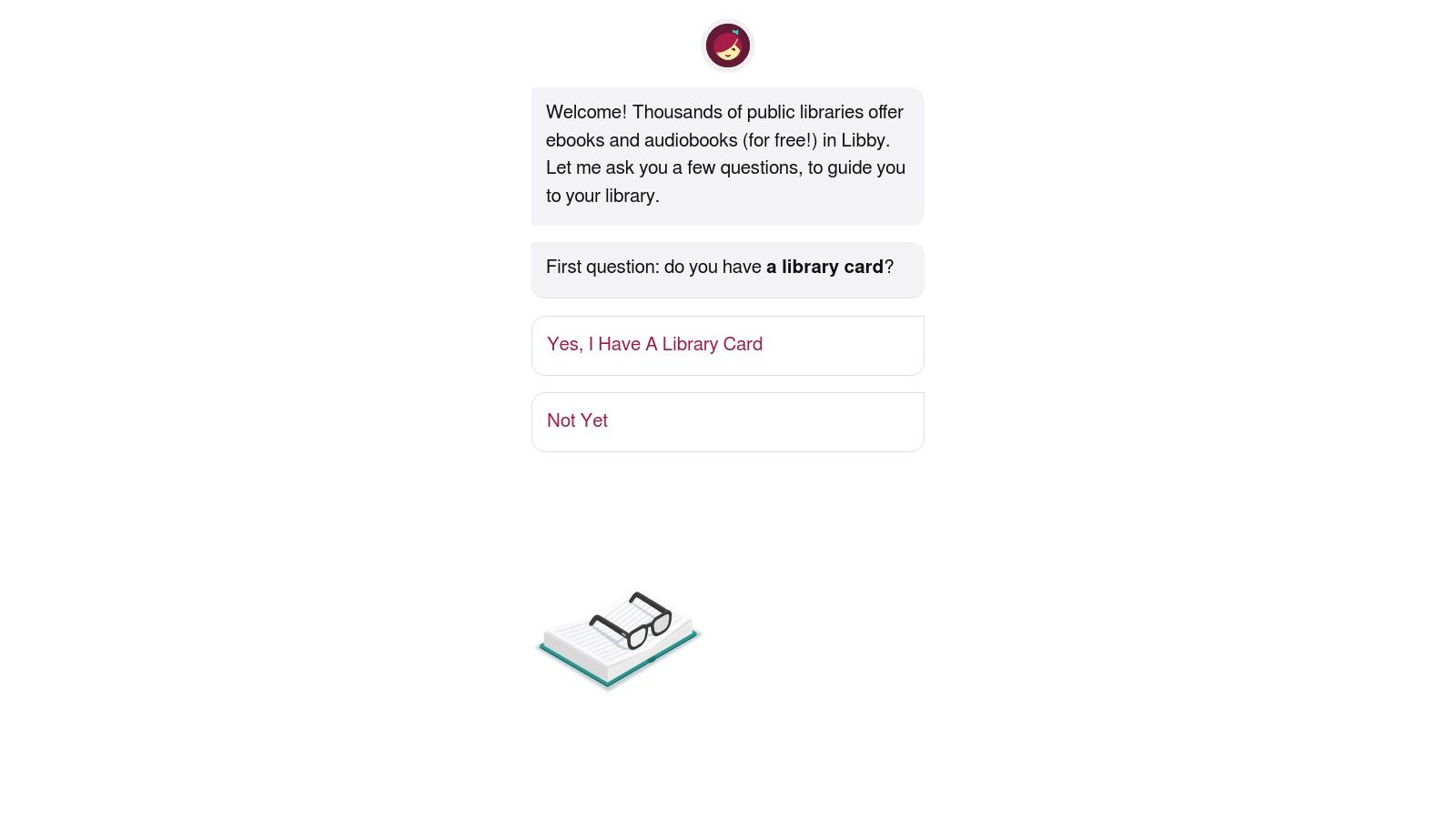
What makes Libby exceptional is its seamless management of multiple library cards and its clean interface that simplifies finding and borrowing titles. The app syncs your reading progress across devices and even offers a "Send to Kindle" option in the U.S. This makes it an ideal choice for older kids and voracious readers who are transitioning to chapter books and young adult novels. Exploring different types of books for kids becomes a cost-effective adventure.
Quick Look
- Best For: Free access to a public library's digital catalog of ebooks and audiobooks.
- Pricing: Completely free to use with a public library card.
- Link: www.libbyapp.com
Pros:
- Provides free access to thousands of titles via your local library.
- Supports multiple library cards and syncs across devices.
- Excellent selection of audiobooks and books for older children and teens.
Cons:
- Book availability and selection depend entirely on your local library's collection.
- Popular titles often have long waitlists or hold times.
- Requires setting up and maintaining an active public library membership.
Key Features Comparison of 12 Kids’ Reading Apps
| Platform | Core Features ✨ | User Experience ★★★★★ | Value Proposition 💰 | Target Audience 👥 | Unique Selling Points 🏆 | Price Points 💰 |
|---|---|---|---|---|---|---|
| Epic | 40,000+ books, audiobooks, videos; Read-to-Me | Extensive library; good offline mobile use | Large, curated content | Kids 2-12 | School & family integration; offline reading | Paid family subscription 💰 |
| ABCmouse | Step-by-step learning; 10,000+ lessons & activities | Structured path; parent progress tracking | Broad early learning suite | Kids 2-8 | Integrated multi-subject learning | Subscription auto-renew 💰 |
| HOMER Learn & Grow | Personalized phonics curriculum; daily lessons | Concise, effective lessons | Affordable annual plans | Kids 2-8 | Research-based reading paths | Family plans, annual ₹ |
| Reading Eggs | Gamified phonics & readers; assessments | Leveled progression; game-style UI | Good for multi-child families | Pre-K to Grade 6 | Strong early phonics focus | Annual plans auto-renew 💰 |
| Hooked on Phonics | Stepwise phonics app + optional physical practice packs | Trusted brand combining digital + print | Hands-on + digital learning | Early readers & families | Physical Practice Packs option | Variable pricing 💰 |
| Khan Academy Kids | Free, ad-free; early literacy + social-emotional | High quality, adaptive learning | Completely free | Kids 2-8 | No cost, expert content | Free |
| Raz-Kids (Learning A-Z) | Leveled ebooks with quizzes; teacher & parent dashboards | Structured practice, progress tracking | School-focused, detailed tracking | School-aged children & families | Fluency recording & badges | Paid licenses 💰 |
| Vooks | Animated narrated storybooks | Kid-safe, simple UI | Engaging read-aloud times | Early readers & families | Animated story videos | Affordable annual with trial 💰 |
| Starfall | Phonics & decodable stories; songs | Budget-friendly, longstanding reputation | Early literacy emphasis | Pre-K to 5th grade | Nonprofit, trusted in classrooms | Membership fees 💰 |
| Teach Your Monster | Game-based phonics; free web play | Engaging; research-backed | One-time purchase apps | Early learners | Free web games + no subscriptions | Free + paid mobile apps 💰 |
| Reading.com | 99 scripted phonics lessons; decodable books | Clear scope; parent-child co-play | Focused phonics instruction | Ages 3-8 | Scripted, guided parent involvement | Subscription varies 💰 |
| Libby by OverDrive | Borrow ebooks/audiobooks from libraries | Free, multi-device syncing | Huge free public library content | Families with library cards | Kindle delivery; large diverse collections | Free with library card |
Choosing Your Co-Pilot on the Journey to Literacy
Navigating the digital landscape to find the best reading apps for kids can feel overwhelming, but the journey is far more manageable when viewed as a search for the right partner, not a single perfect solution. As we've explored, the ideal app is deeply personal, aligning with your child's current developmental stage, learning style, and individual interests. The key is to match the tool to the task at hand.
The most effective strategy often involves a thoughtful combination of resources. You are not locked into one ecosystem. A hybrid approach allows you to leverage the unique strengths of different platforms to create a well-rounded and engaging literacy environment for your child.
How to Select the Right Mix for Your Child
To build your child's personalized digital library, consider their specific needs.
- For Foundational Skills (Ages 3-6): If your child is just beginning their reading journey, prioritize apps that excel in phonics and letter recognition. Programs like HOMER Learn & Grow, Hooked on Phonics, and Reading.com offer structured, game-like lessons that make learning the building blocks of reading feel like play.
- For Emergent Readers (Ages 5-8): As children start to decode words independently, their confidence needs fuel. A vast and varied digital library is crucial here. Epic is the undisputed champion for sheer volume and variety, while Raz-Kids provides a more structured, level-based approach perfect for steady progression.
- For reluctant readers or visual learners: Sometimes, the traditional format of a book needs a little extra magic. Vooks brings stories to life with beautiful animation, capturing the attention of children who may not gravitate toward static pages.
- For Budget-Conscious Families: High-quality learning doesn't have to come with a high price tag. Khan Academy Kids offers a comprehensive and completely free curriculum, while Libby unlocks your local library's entire digital collection, providing endless reading material at no cost.
Implementing Apps for Maximum Impact
Remember, these powerful tools are supplements, not substitutes. The goal is to use technology to enhance, not replace, the irreplaceable connection forged by reading together. Set aside dedicated time for app-based learning, but also maintain the cherished rituals of snuggling up with a physical book and visiting your local library.
Integrating technology into a child's routine is part of a broader effort to build responsible digital habits. Beyond academic pursuits like reading, there are many digital tools available to help children develop other essential life skills, such as responsibility and organization. For instance, you might explore various helpful resources like these digital apps for kids' chores to help manage daily tasks and foster a sense of accomplishment.
Ultimately, the best reading app is the one that sparks curiosity and transforms the hard work of learning to read into a joyful adventure. By thoughtfully choosing and combining these digital co-pilots, you can provide powerful, personalized support that helps your child not only master the mechanics of reading but also discover a lifelong love for the stories that will shape their world.
At Number 6 Publishing, we believe that every child deserves to see themselves in a story and find books that ignite their imagination. While apps build skills, our curated collections of middle-grade and young adult fiction are designed to build lifelong readers. Explore our catalog at Number 6 Publishing to find your child's next great literary adventure.
